Showing 71–75 of 104 results
-
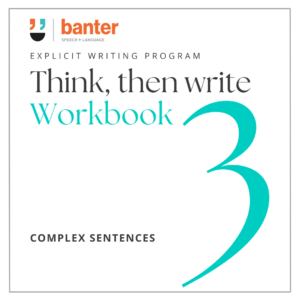
$95.00 including GST
This 650+ page workbook includes scaffolded writing practice to help students of all ages generate a variety of complex sentences using subordinating conjunctions, including:
-
- “because” – for cause and effect relationships;
- “although” – for contrastive relationships;
- “if”, “unless” and “until” – for conditional relationships; and
- “while”, “before” and “after” – for relationships between events connected by time.
For each conjunction, sentence fragment exercises have been included to kick-start complex sentence writing. To support people with additional language and learning needs, the modules feature topics that require a minimal amount of background knowledge, and include examples and scaffolds to help model and support students of all abilities.
-
Sale!
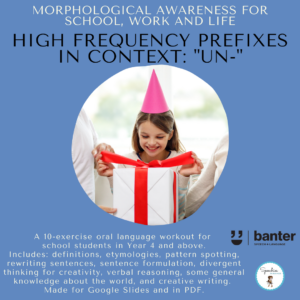
$6.99 Original price was: $6.99.$0.00Current price is: $0.00. including GST
In this 19-page resource, we teach students that the prefix “un-” means “not” or the “opposite of”.
It contains 10 activities designed to teach and consolidate this knowledge. Activities include:
-
- teaching the definition and etymology of the prefix, “un-”, for comprehension and spelling;
- a procedural word learning writing activity;
- auditory bombardment -listening to “un-” words in sentence context;
- a highlighting activity: spotting the prefix in sentences;
- a sentence rewriting exercise requiring students to replace words with a word using the “un-” prefix;
- a sentence formulation exercise with semantic constraints: making original sentences using words with an “un-” prefix;
- a divergent naming exercise: creative thinking using words with “un-” prefixes;
- a general knowledge investigation;
- a verbal reasoning/persuasive writing exercise: generating pros and cons for arguments including “un-” words; and
- a story-making exercise with “un-” words.
This resource is one of nine modules covering the most frequent prefixes uses in English. Fully scripted, the module is is suitable for one-to-one, small group and whole class instruction; and can be downloaded in PDF and Google Slides format.
-
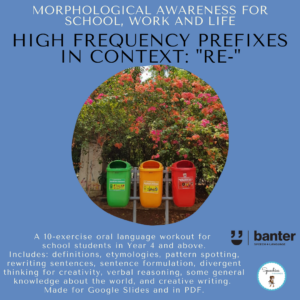
$6.99 including GST
In this 19-page resource, we teach students that the prefix “re-” means “back”, “again” or “undoing”.
It contains 10 activities designed to teach and consolidate this knowledge. Activities include:
- teaching the definition and etymology of the prefix, “re-”, for comprehension and spelling;
- a procedural word learning writing activity;
- auditory bombardment – listening to “re-” words in sentence context;
- a highlighting activity: spotting the prefix in sentences;
- a sentence rewriting exercise requiring students to replace words with a word using the “re-” prefix;
- a sentence formulation exercise with semantic constraints: making original sentences using words with an “re-” prefix;
- a divergent naming exercise: creative thinking using words with “re-” prefixes;
- a general knowledge investigation;
- a verbal reasoning/persuasive writing exercise: generating pros and cons for arguments including “re-” words; and
- a story-making exercise with “re-” words.
This resource is one of nine modules covering the most frequent prefixes uses in English. Fully scripted, the module is is suitable for one-to-one, small group and whole class instruction; and can be downloaded in PDF and Google Slides format.
-
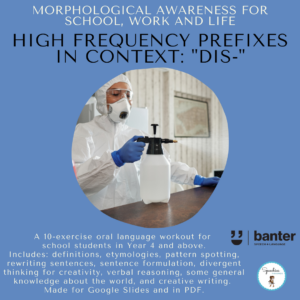
$6.99 including GST
In this 19-page resource, we teach students that the prefix “dis-” means “lack of”, “opposite” and “apart, away”.
It contains 10 activities designed to teach and consolidate this knowledge. Activities include:
- teaching the definition and etymology of the prefix, “dis-”, for comprehension and spelling;
- a procedural word learning writing activity;
- auditory bombardment – listening to “dis-” words in sentence context;
- a highlighting activity: spotting the prefix in sentences;
- a sentence rewriting exercise requiring students to replace words with a word using the “dis-” prefix;
- a sentence formulation exercise with semantic constraints: making original sentences using words with a “dis-” prefix;
- a divergent naming exercise: creative thinking using words with “dis-” prefixes;
- a general knowledge investigation;
- a verbal reasoning/persuasive writing exercise: generating pros and cons for arguments including “dis-” words; and
- a story-making exercise with “dis-” words.
This resource is one of nine modules covering the most frequent prefixes uses in English. Fully scripted, the module is is suitable for one-to-one, small group and whole class instruction; and can be downloaded in PDF and Google Slides format.
-
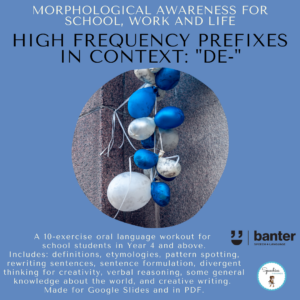
$6.99 including GST
In this 19-page resource, we teach students that the prefix “de-” means “down” or “down from”.
It contains 10 activities designed to teach and consolidate this knowledge. Activities include:
- teaching the definition and etymology of the prefix, “de-”, for comprehension and spelling;
- a procedural word learning writing activity;
- auditory bombardment – listening to “de-” words in sentence context;
- a highlighting activity: spotting the prefix in sentences;
- a sentence rewriting exercise requiring students to replace words with a word using the “de-” prefix;
- a sentence formulation exercise with semantic constraints: making original sentences using words with a “de-” prefix;
- a divergent naming exercise: creative thinking using words with “de-” prefixes;
- a general knowledge investigation;
- a verbal reasoning/persuasive writing exercise: generating pros and cons for arguments including “de-” words; and
- a story-making exercise with “de-” words.
This resource is one of nine modules covering the most frequent prefixes uses in English. Fully scripted, the module is is suitable for one-to-one, small group and whole class instruction; and can be downloaded in PDF and Google Slides format.





